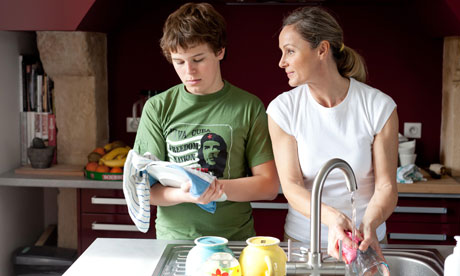
How did you learn about relationships and sex? Was it good, bad or indifferent? Was it through friends, films and TV, older brothers or sisters, personal experience, or did you get sex education at school? Perhaps it was from your mum or dad? And if it was from your mother or father does the recollection of 'that conversation' elicit some uncomfortable memories of a stuttered and mortified parent desperately trying to explain the facts of life to you?
How you learned about sex is the first question posed by tutors running FPA's Speakeasy course. It helps parents and carers gain the confidence and skills to talk to their children about sex, relationships and sexuality and growing up.
Many parents – because their own parents struggled to talk to them – can't approach the subject with their children. "How do I start to talk about this with my child?" is a frequent response from parents, along with: "I don't feel confident answering that kind of question", or, disconcertingly, "what if they know more than I do?""
Then there's the fear that talking about sex will encourage a child to experiment with sex too early or before they're mature enough to deal with it. (It won't: for the record the evidence shows that the opposite is true.) No wonder so many parents would rather leave it to schools.
Yet many parents are ambiguous about the role of schools, with views ranging from: "Let them deal with it" through to a fear that "they're taking our children's innocence".
And when schools do make an effort to engage parents – such as arranging video evenings where the teaching resources are explained – many are too embarrassed or don't think it's important enough to turn up. Conversely schools that take sex and relationships education very seriously can be heavily criticised by professional lobby groups who believe that sex education should only be done by parents.
However, leaving it to parents assumes that all parents will talk in an open and honest fashion so that their children will become young adults who can make choices for themselves. For many reasons this often doesn't happen or happens too late.
Similarly, just leaving it to the schools takes away the challenge and responsibility of parents to engage with this aspect of their children's lives, and their physical and emotional development.
After all, the school won't field the questions about where babies come from while you're trawling the vegetable aisle in Tescos. Children can catch you off-guard with questions. And maybe it's better that way. Tackling a sexuality conversation face to face as a serious sit down lecture can be fraught for all concerned. But talking about sex and relationships when you're driving, washing-up walking or shopping can relieve some of the eye-to-eye intensity of the situation.
The main thing is to make sure that the 'facts of life' talk isn't a one-off lecture but an ongoing conversation that your children feel they can come back to. Also, getting to know the topics a school will be covering over the coming term means you can anticipate questions and tackle them 'casually' through everyday conversations and support it in the home.
The truth is, like most parenting issues: it's a bit of a team effort. No matter how good your school's approach, there's no substitute for parental advice on the intimate subjects of relationships, puberty changes, growing up and sex.
Programmes such as FPA Speakeasy can build your confidence. As a result you might find it improves the quality of your relationship with your children – and allows them to go on to talk about other difficult issues like drugs and alcohol. But that's another discussion ...
• David Kesterton is parenting and community project manager at the FPA. He will be among the panellists for a live discussion on sex and sexuality education, taking place on the SocietyGuardian site from noon to 2pm on Thursday 31 May

